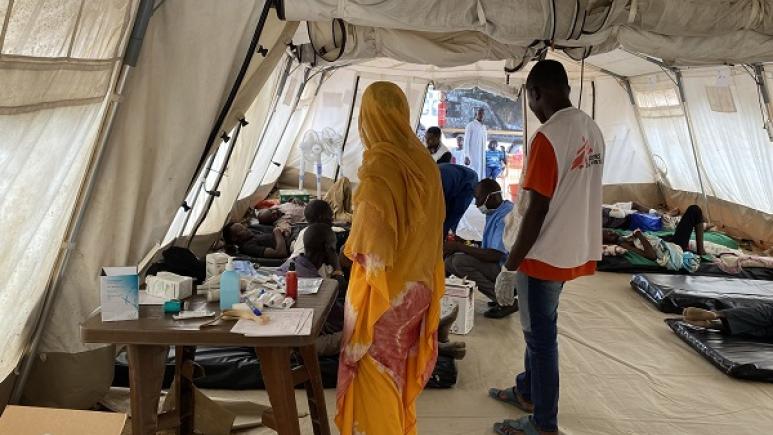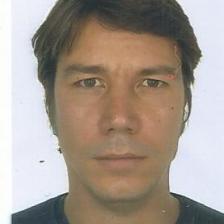Revealing the scale and intensity of ethnic violence in West Darfur
Epicentre conducted retrospective mortality surveys between August and September 2023 in three refugee camps, Toumtouma, Arkoum and Ourang, which were home to an estimated 6,000, 44,000 and 25,000 people, respectively, at the time of the survey.
Ourang camp: a twenty-fold increase in deaths during the crisis
While the results indicate a significant increase in mortality from the start of the conflict in Sudan in 2023 among households in the three refugee camps, the refugees in the Ourang camp, who came mainly from El Geneina, have been hardest hit. The mortality rate reached 2.25 deaths per 10,000 people per day between mid-April and the start of the survey, with a peak in June, which corresponds to a twenty-fold increase in the mortality rate compared with the previous period. 83% of those killed were men, and 82% of deaths were the result of violence, most of which involved a firearm (79%). The majority of deaths took place in El Geneina and a quarter occurred during the displacement to Chad. Nearly one man in twenty aged between 15 and 44 was reported missing during this period.
An escalation of ethnic violence
Among households in Toumtouma camp, the mortality rate more than doubled between mid-March and the previous period. The crisis phase began earlier than in the other two camps, due to inter-community tensions that erupted at the end of March in West Darfur and drove important population displacements towards Chad. Of the 62 deaths, 42 were refugees, 19 returnees and 1 displaced person. This camp differs from the other two in terms of its population: 60% of the population surveyed were refugees and 36% returnees. The first arrivals were ethnic Zaghawa returnees with deep roots in the area, living in localities just outside the border and often returning to see their families back in Chad. The other two camps were almost entirely made up of refugees, most of whom were Masalit.
Among households in Arkoum camp, the mortality rate more than tripled between mid-April and the period before the crisis. As in Ourang, violence was the main cause of death reported, accounting for 77% of cases in Toumtouma and 50% in Arkoum. The majority of deaths occurred in the deceased's town/village, or during their displacement to escape the violence of the fighting. The age group most affected was men over 30, of whom over 4%, 11% and 2% respectively died of violent causes in Toumtouma, Ourang and Arkoum during the recall period.
"The survey results corroborate the testimonies of some 1,500 wounded Sudanese that were treated by our teams in collaboration with the Chadian health authorities in the surgical unit at Adré hospital since last June”, said Claire Nicolet, head of emergency programs in Chad at Doctors without borders (MSF). “The largest influx of wounded we experienced in Adré, with 858 war-wounded received between 15 and 17 June, corresponds to the peak mortality rate observed in the survey. Many of the wounded reported that Arab militiamen were targeting them because of their Masalit ethnicity and shooting at them in El Geneina. They told us that this violence then continued in the villages and checkpoints along the road to Chad, with men from the Masalit community being systematically targeted", said Claire Nicolet.
The accounts of refugees who have fled West Darfur over the last six months paint a picture of an unbearable spiral of violence. Rooted in political, economic and land rivalries between the communities present on the territory, the ethnic dimension of the violence has taken a particularly extreme turn in the capital El Geneina, which is now virtually empty of the Masalit community that used to live there.
“They told us that this wasn’t our country and gave us two options: immediately leave for Chad or be killed. They took some men and I saw them shooting them in the streets, with no one to bury the corpses” said H., a twenty-six-year-old refugee who fled to Adré from El Geneina. “On the road to Chad, we were stopped at many checkpoints. They were asking us what tribe we were from. They were targeting Masalit people” added another patient treated by MSF in Adré.
One of the most recent episodes of violence took place in November in Ardamatta, to the north-east of El Geneina. Hundreds of people have been reportedly killed when the militias took control of the area which hosted a large camp for displaced people and a garrison of the Sudanese armed forces.
“333 wounded, mainly people coming from Ardamatta with gunshot wounds, were treated in Adré by MSF and the Chadian Ministry of Health's medical teams during the month of November”, added Claire Nicolet.
Children, a population not spared
The survey also assessed the prevalence of global acute malnutrition in children aged between 6 and 59 months on the basis of mid-upper arm circumference (MUAC) and the presence or absence of nutritional oedema. It was over 10% in the Ourang and Arkoum camps, which is above the threshold considered serious by the Integrated Food Security Classification framework of global partners (1). The age group most affected was 6-23 months, particularly in Ourang and Arkoum, where the prevalence of global acute malnutrition reached 29% and 30% respectively.
In addition, measles vaccination coverage was insufficient, at only 59% in Toumtouma, 76% in Ourang and 64% in Arkoum, far from the minimum coverage of 95% recommended by the World Health Organisation, to prevent epidemic outbreaks. In Ourang camp, 33% of deaths among children under the age of 5 were attributable to measles, followed by violence (30%) and malnutrition (11%).
The conflict in Sudan has led to a major humanitarian crisis in eastern Chad, where almost half a million people have found refuge, alongside already vulnerable local communities and thousands of other Sudanese refugees who have been in the country for two decades. Significant financial, logistical, and human resources are still needed to step up the humanitarian response, particularly emergency food aid, in Adré and the surrounding camps. MSF teams continue to provide a wide range of medical care in Adré hospital and in various clinics and health centres (paediatrics, maternal health, nutrition, trauma surgery, vaccinations, mental health, etc.) and to work to improve access to water, hygiene and sanitation services.
To find out more about the survey methodology
Three cross-sectional surveys were carried out, the first with systematic random sampling in Toumtouma camp from August 7 to 13, and the next two in Ourang camp from August 17 to 22 and Arkoum camp from August 30 to September 4, 2023 with cluster random geospatial sampling. Each survey covered retrospective mortality, frequency and type of violent events experienced, nutritional status of children aged 6 to 59 months, and measles vaccination coverage among children aged 6 months to 14 years. The recall period ran from January 1 to the day of the survey, i.e., a minimum of 210, 228 and 241 days respectively. Two phases were considered: 1) the pre-crisis phase (Toumtouma: January 1 - March 14, 2023 / Ourang and Arkoum: January 1 - April 14, 2023) and 2) the crisis phase (Toumtouma: March 15 - day of survey / Ourang and Arkoum: April 15 - day of survey). In Toumtouma camp, the crisis phase started earlier due to inter-community tensions that erupted at the end of March in West Darfur and drove important population displacements towards Chad.
A representative sample of 3,093 people acting as head of household - 1,032 households in the Ourang and Toumtouma camps and 1,029 in the Arkoum camp – were interviewed about all household members present at the start of the recall period, those who left, arrived, were born or died during this period, before and after the start of the conflict. This made it possible to calculate crude mortality rates and compare the two periods. This is one of the most widely used indicators for assessing the severity of a crisis among a given population.









